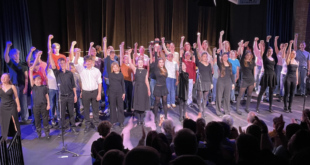News
Paul, a radiology doctor in the east of England, spoke to Socialist Worker about the forthcoming junior doctors’ strike from 14 to 17 June—and the BMA union’s plans for 3-days of strikes per month during the summer.
By Yuri Prasad
Downloading PDF. Please wait…
Thursday 25 May 2023
Issue 2857
Striking junior doctors at University College Hospital in central London in April (Picture: Guy Smallman)
What was the mood like at work when the long period of pay negotiations ended and the new strike plans were announced?
There’s been a hardening of attitudes among junior doctors during the previous strike periods, and people now seem to be in the rhythm of it all. They are frustrated with the government and the way the talks have gone, but they really understand what they are fighting for.
The grassroots of the movement are really strong in support of the strike and know why it needs to happen.
But it’s also true that junior doctors’ strikes have not got the same media and public attention as those by other groups of workers. Perhaps that is because unlike, say train drivers, you can’t see the effect of the strike in a tangible way. That does affect things.
How did your colleague react to the health secretary’s new offer of a 5 percent rise?
It’s difficult for me to express just how much anger there is about that. It means our demand for pay restoration is not being taken at all seriously. The government has simply not understood the scale of the problem.
The fact that we are now likely to be in a prolonged period of industrial action before reballoting in August is exactly what we wanted to avoid. We set out from the beginning with a strategy of hard action but now the government has forced us to repeat it again and again.
My view is that if you are not prepared to strike in a meaningful way, you are not negotiating, you are begging. Trade unions should not be about “asking”, they should be about “demanding”.
I think that fits into a broader discussion of workers’ power and the trade unions. Strikes are the way in which workers discover they have power, and once people get a taste for it, it’s like a genie that won’t go back in the bottle.
What are the key ways in which people can support the junior doctors’ strikes?
The first thing is that we really want nurses in the RCN union to win their England-wide ballot and beat the threshold for strikes. That’s not just because we want them to get the best deal. They are the biggest part of the NHS workforce, so if they win, everyone wins.
They are also the loudest voices among health workers. There’s more chance of us being heard if we stand together, if we’re on picket lines together – and I know that from having joined them when they were out on strike earlier in the year. Nurses re-joining the fight would mean we junior doctors would not be fighting on our own.
More broadly than health workers, I want other workers to join our picket lines because it helps to personalise the issues we are striking over.
And supporting us is also about inspiring others. There are many groups of workers that face similar erosion of pay and conditions to the rest of us, but which are not yet striking. Our strike sends a message to them, it says, if you’re being badly treated, then you should be out on strike too. You don’t have to ask permission—strikes are supposed to be acts of disobedience.
I want the junior doctors’ strike to be a dress rehearsal for a much bigger fight that’s coming—one that involves many more people. We all need to fight back.
Source link



